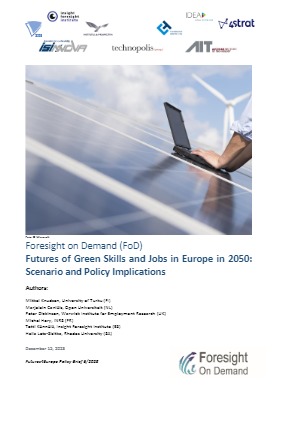Climate change and environmental degradation are an existential threat to the European Union and to the world. As a response, among other things, the European Green Deal aims to make Europe climate-neutral by 2050, boost the economy through green technology, create sustainable industry and transport, and cut pollution. The transition towards greener and more sustainable economies is a game changer in the EU labour market alongside digitalisation and automation. Skill needs will change with impacts far beyond the key occupations driving them, affecting all economic sectors.
Europe needs to promote and support green employment, address the skilling and reskilling of workers, and anticipate changes in workplaces of the future. In order to get a better grasp on potential future outcomes, and better anticipate their potential policy implications, a foresight Deep Dive has been carried out. The Deep Dive uses a broad conceptualization of skills that encompasses the full palette from scientific and engineering skills to vocational and crafts-like skills. All are needed in the green labour market, although the scenario-led focus here for the most part is on skills of vocational professions. This policy brief presents the main findings.
A set of four different scenarios for the futures of green skills and jobs in Europe in 2050 were crafted:
- Scenario A: Green technology-intensive Europe: Struggling to fill all the green jobs
- Scenario B: Apocalypse Soon: Fighting skills mismatches in a degraded environment
- Scenario C: Feeling the pain: A workforce left behind in a non-green world
- Scenario D: Green leapfrogging: Old, mismatched Europe surrounded by new green giants




